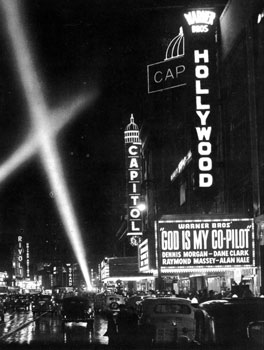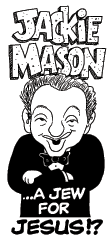What Milton Berle, Jack Benny, and Jesus Have in Common (and Why I'm Changing my Name)
 Note: [RA]in this article links to a RealMedia file; [FL] to a Flash presentation.
Note: [RA]in this article links to a RealMedia file; [FL] to a Flash presentation.You've heard it before. How so many well-known Jewish comedians and Hollywood stars changed their given name, or had their name changed for them. In the eyes of the larger world, the new name gave them an appeal, a glamour, an élan that they otherwise lacked. Bernie Schwartz sounds like an accountant, but call him Tony Curtis and suddenly you have a hot property on the silver screen [RA]. Similarly Issur Danielovitch became Kirk Douglas, Aaron Chwatt reinvented himself as Red Buttons, and Milton Hines turned into a household name as Soupy Sales [RA].
I'm not a celebrity, but I feel that I too need more appeal and charisma in my personal life. So I've come up with a plan. I'm going to remake myself as the kind of Jewish comedian who worked in the old days. The old days, for the purpose of my identity makeover, is defined as the time before comedians were called "comics" and before comics were called "comix."
After much angst over an appropriate stage name, I have finally settled on—Leafy Green®. Don't laugh at me. I happen to think that Leafy Green® is very much in the tradition of Soupy Sales and Red Buttons. I believe Leafy Green® will work because it includes a Jewish surname yet also sounds environmentally friendly. Of course, since this is 2006 and not 1966, I will have to update the shtick a little. I might still do the old routine about spouses who can't cook but with a name like Leafy®, I'll also have to involve salads and ecology, and maybe the rain forests [FL]. "Al Gore still can't figure out where global warming comes from. He should stop by our kitchen when my wife's cooking dinner..." It's still a work in progress but I'm confident that with the proper delivery and the right audience, I will finally have the broad appeal that I am looking for in life.
There are other kinds of name changes, but I'm not going to consider them for myself. Most Jews who changed their names didn't do so to acquire the sparkle of Hollywood tinsel. Sometimes they just wanted to fit in. For some, there was a point in the immigrant experience where a family left the old country under one name and emerged in American society with another, the rationale and the details now lost to memory.
Sometimes there was a desire to denigrate someone, to make them less instead of more, to diminish them as a person. Take Jesus of Nazareth, possibly the most famous Jew of all time. (And don't tell me, "Please, take Jesus." Henny Youngman [RA]—whose real first name was Henry—owned that line, or one like it anyway.) Jesus' name was changed too. His mother Mary (real name: Miriam) actually named him Y'shua, which was subsequently changed to Iesous for the Greeks and finally to Jesus for the English speakers. So far so good. After all, the Greeks couldn't say the "sh" sound and why should they miss a chance to hear about Jesus just because they couldn't pronounce his name? From being called Iesous and Jesus, Y'shua received an audience among non-Jews for his basically Jewish message.
But the name changes didn't end there. I can't tell you who made the decision, but somewhere along the line somebody decided they would change Jesus' name for him, like the neighborhood bully who tells you that he doesn't like your face so he's going to rearrange it for you. And so in the vernacular of some, Y'shua became Yeshu, which was intended to be a pun, an acronym for the Hebrew words, "May his name be blotted out." The equivalent would have been making Bernie Schwartz to be Bernie Schmutz instead of Tony Curtis. Among older generations of Jews, that's how Jesus was known—as Yeshu, may his name be blotted out, the one to be forgotten.
Others didn't even leave a name, and called him "That Man"—you know, the One We Don't Talk About. Interestingly, some of my Jewish landsleit will be very happy to tell me at length what they really think about Jesus, about the one we wanted to blot out and forget and not talk about. Seems like there's still a lot to say.
Unlike "Yeshu," "Y'shua" means "God will save." He was given that name because "he will save his people from their sins,"* a message that should make sense to any Jew who's been in shul on Yom Kippur—"his people," of course, being the Jews. With the change to Iesous and Jesus, it became easier for non-Jews to also hear that he would save them from their sins.
 Let's be honest. It wasn't just a change of name that gained Y'shua a hearing throughout the world. It was the message. One reason Jackie Mason (real name: Jacob Moshe Maza) is so popular among Jews and gentiles is that what he has to say is universal. The message that God sent the Messiah to atone for our sins and heal our relationships is also universal. The Bible, both Old and New Testament, is as Jewish a book as any, but it speaks to everyone.
Let's be honest. It wasn't just a change of name that gained Y'shua a hearing throughout the world. It was the message. One reason Jackie Mason (real name: Jacob Moshe Maza) is so popular among Jews and gentiles is that what he has to say is universal. The message that God sent the Messiah to atone for our sins and heal our relationships is also universal. The Bible, both Old and New Testament, is as Jewish a book as any, but it speaks to everyone.There's a lesson in all of this when I begin my stage career as Leafy Green®. I hope my new name will garner big audiences. But I know that when the curtain falls, if I don't have good material, nothing in the world will help.
* Matthew (name changed from Mattithiah) 1:21, in the New Testament.

2 Comments:
At 8:31 PM, Anonymous said…
Anonymous said…
Actually, yemach shemo v'zichro, which comprises the acronym in question, means "may his name and memory be blotted out."
Just saying. Carry on.
At 10:04 AM, numismel said…
numismel said…
Milton Berle Inducted into Jewish-American Hall of Fame
A portrait plaque of Milton Berle has been mounted along with those of over three dozen previous inductees in the Jewish-American Hall of Fame exhibit at B’nai B’rith International’s headquarters in Washington DC. Inaugurated in 1969, past Hall of Famers include Haym Salomon, Albert Einstein, Louis Brandeis, Benny Goodman, Golda Meir and Hank Greenberg. Contributors of $36 to the non-profit Jewish-American Hall of Fame will receive a limited edition Milton Berle medal. For further information call (818) 225-1348 or visit their award-winning website at www.amuseum.org/jahf.
Milton Berle, known as “Mr. Television” and “Uncle Miltie,” was born as Milton Berlinger in New York City on July 12, 1908, His onstage antics got underway in 1913 when he won a look-alike contest with his impersonation of Charlie Chaplin. Berle appeared as a child actor in silent films, beginning with The Perils of Pauline (1914), filmed in Fort Lee, New Jersey with Pearl White.
In spite of a very busy career, young Milton still managed to be bar mitzvahed, as he describes:
“The first summer of our time on the Orpheum (Vaudeville) Circuit, I turned thirteen. This is a big moment in a Jewish boy’s life. It was the one ritual my mother insisted upon. Only, it would have to wait until we got back to New York. I’d have to stay a Jewish boy a while longer. Meanwhile, Mama wrote to Rabbi Benjamin Tintner at the Mt. Zion synagogue, sending him the date when I could be bar mitzvahed and asking that he send by return mail whatever I should study for the great day. It was added to my other homework.
Finally, at the beginning of October 1921, Kennedy & Berle were playing New York again. On Saturday morning, October 1, I had my bar mitzvah at the Mt. Zion Temple on 119th Street between Fifth and Lenox, a good location, because I had a matinee to do that afternoon (at the Alhambra Theatre, 126th Street and Seventh Avenue). For a while, while writing my “today I am a man” speech, I thought of putting in a plug for the show at the Alhambra, but I took it out at the last minute. To my amazement, when I finished my speech, Rabbi Benjamin Tintner said to the congregation, ‘You think that’s something? You want to go over to the Alhambra Theatre before tomorrow night, when he closes, and you’ll see what this young man can do!’ Little did I know that Mama had gotten to him before the service to give me the plug, Boy, was I embarrassed – but not too much.”
In 1942, Milton Berle accepted an offer to star in the Ziegfeld Follies on Broadway. To illustrate what a major box-office attraction Berle had become, the producers agreed to put his name above the title of the show. This was a huge concession, and Berle says it's the only time in the history of the Follies that a performer saw his name above the title! The Ziegfeld Follies opened on April 1, 1943, and ran for 553 performances. As if that wasn't enough to keep Berle busy, he also found the time to squeeze in camp shows for the GIs, benefits for the Red Cross, appearances to help sell war bonds and broadcasts for Armed Forces Radio. He also entertained troops in Vietnam.
Milton Berle received one of the first Emmy Awards ever given for starring in NBC's Texaco Star Theater (1948), was the first person to be inducted into the Television Hall of Fame (1984), the first inductee into the Comedy Hall of Fame (1992), and the first to receive a Lifetime Achievement Award from the New York Television Academy (1996).
Berle was named to the Guinness Book of World Records for the greatest number of charity performances made by a show-business performer over a period of 50 years. He hosted the first charity telethon (for the Damon Runyan Cancer Fund) in 1949, and years later became a permanent fixture at charity benefits in the Hollywood/Los Angeles area, where Milton Berle was instrumental in raising millions of dollars.
Post a Comment
<< Home